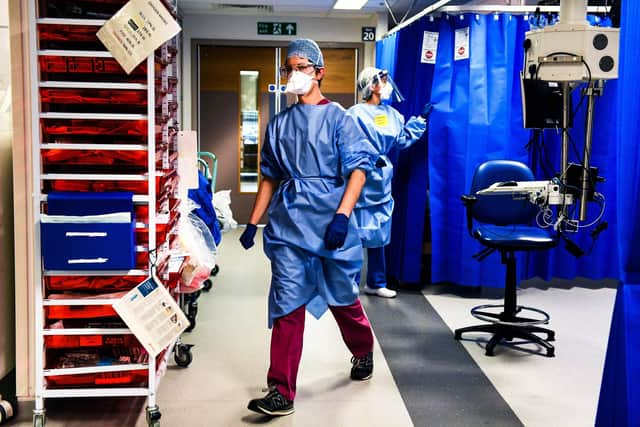NHS Scotland crisis: Hospitals have too few beds to cope with peak demand this winter amid 'not enough' doctors
Scotland’s hospitals have too few beds for the “overstretched” NHS to deal with peaks in demand this winter, MSPs have been told, with a warning that there could again be an “increased risk of death” for patients.
John-Paul Loughrey, Scottish vice-president of the Royal College of Emergency Medicine, said last winter had been the “worst for a generation, and the worst probably in the history of the NHS” for those working in emergency care.
Advertisement
Hide AdAdvertisement
Hide AdBut he said the summer months had failed to bring an easing of the pressure, telling MSPs on Holyrood’s Health Committee that cuts to NHS bed numbers had “probably gone too far”.


Mr Loughrey, a consultant in emergency medicine at the Queen Elizabeth University Hospital in Glasgow, also highlighted the “tenacious” number of people having to remain in hospital while they wait for care packages.
In an evidence session on winter planning, he said he had “extensively” asked those in the other medical Royal colleges for their view on the situation.
The doctor told the committee the view was “unanimous that this is no longer a winter problem, this is an NHS in crisis problem”.
Short-term measures put in place for winter months would only be “crisis mitigation”, he added.
He told MSPs: “The winter plan of last year focused on crisis mitigation and some short-term measures, but without a longer term strategy to avoid further winters like we had in the last one.
“And we haven’t really seen any abatement in the pressure on emergency departments or, indeed, across primary care and all the acute specialities in the summer like we normally would.
“What we have seen this year is a decrease in our workforce, so we are seeing a dwindling of the workforce across all sectors in Scotland.
Advertisement
Hide AdAdvertisement
Hide Ad“And what we haven’t seen so far is any future planning that involves more than just trying to deal with the next winter crisis.”
As well as hospitals having a “workforce problem” he said there were “overall capacity problems”, explaining these were party a result of “a tenacious number of delayed discharges in hospitals”.
But he added that over the last 10 to 15 years “the reduction in the acute and general bed base has probably gone too far and we now have too few beds in Scotland in order to deal with these winter surges on top of an already over capacity and over stretched system”.
Citing a “wealth of data” as showing long waits in accident and emergency can lead to an increased risk of death for patients, he told the committee data from the National Records of Scotland had shown a 6% increase in mortality over last winter compared to the average.
“We can expect unfortunately we will see similar risk of increased death over this winter,” he said
He added there was need to “be honest with telling people” what to expect over the coming winter, citing virtual consultations as one option.
While he said holding consultations over platforms such as Zoom “may take a bit of getting used to” for some patients, he said that “many consultations can happen in that virtual manner, especially in primary care”.
Caroline Lamb, the chief executive of NHS Scotland, said there was a need to “support the system to manage unscheduled care as effectively as possible throughout the year”.
Advertisement
Hide AdAdvertisement
Hide AdShe told the committee: “I think we recognise our focus needs to be on improving the systems year round, but there will always be points of surge and points of additional pressure.
“Winter has traditionally been one of those because of the increase in respiratory illnesses, and also because of people having accidents due to adverse weather conditions.”
Ms Lamb stressed that the NHS had “reflected” on last year’s winter planning, adding that they had “learned lessons”.
She told MSPs: “The approach we have taken this year has been has been to start much earlier but also to absolutely engage in that whole system planning.
SNP MSP David Torrance pressed her on when this year’s winter plan would be published, saying last year’s had been criticised for “coming too late” when it was published in October.
Ms Lamb said the winter plan for this year would be put to Parliament in October, but added: “The difference from last year is the amount of work that has already gone in to developing that plan.
“We started the planning in March coming off the back of last winter with a really clear focus on the actions that were necessary to improve flow through our hospitals.”
Comments
Want to join the conversation? Please or to comment on this article.